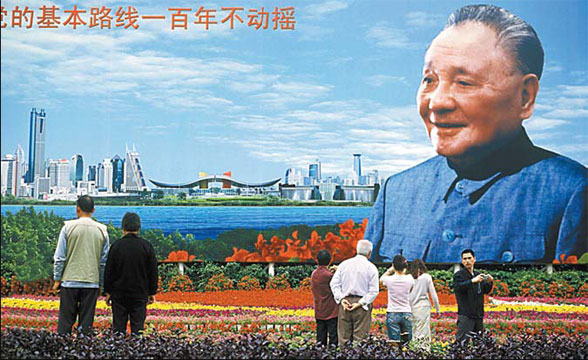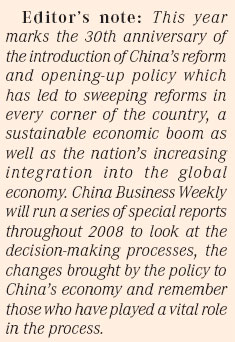


China's economic miracle of the past 30 years has proven true the late leader Deng Xiaoping's famous saying that the opening up would be like "crossing the river by feeling the stones".
Those with pioneering spirits, no matter if they were intellectuals, farmers, workers or State leaders, deserve Chinese people's utmost respect, as their wide-ranging experiments have sustained the nation's development, both social and economic.
Set amid the budding urban cluster of Chengdu, Deyang and Mianyang in the Sichuan Basin, Xiangyang, among China's thousands of towns, is famous as the first to dismantle a people's commune in 1980. The experimental action led China to amend its Constitution in 1982 as all other communes followed in its footsteps.
China Business Weekly reporter Fu Jing recently traveled to the town and spoke with 68-year-old Zhong Taiyin, former township head and Wang Hong, current Party chief of the township:
Q: You were not only a witness, but also among the decision-makers in the brave action (of dismantling the commune). Were you afraid then as people were still in the aftermath of class struggle?
Zhong: The action was an experiment. And you know, four years had passed after the end of the "Cultural Revolution" and the nation was brainstorming for solutions to improve agricultural production. The people's commune, a merger of economic, social, political and governmental functions, was introduced in 1958. To put it simply, figures can tell how low the efficiency was in the commune system. Per capita annual income was 68 yuan in 1956 and 74 yuan in 1976 for residents in Xiangyang. Twenty years saw no progress and we were all in poverty.
We were not afraid. We had made a lot of preparation before submitting the proposal to the government, which verbally agreed with our action. And high-level officials had even encouraged us by saying: "Be brave, please. If it's a failure, we can go back to the commune system."
Q: What preparations had you and your colleagues already made?
Zhong: I will tell you a story first - in the 1970s, a British journalist visited our commune and found a very interesting disparity: the crops in a small plot of land allocated to a local household were growing much better than those in the fields owned by the commune. Why? Motivation had made the difference. Just around 1980, we allocated the land to production divisions and teams and allowed them to compete with each other by giving them incentives. They were encouraged and crop yields improved by big margin.
And at the same time, we opened several companies by taking advantagesof our geographical advantages we are close to Chengdu and next to the national road linking Sichuan and Shaanxi provinces. So we insisted on the principle, "practice is the sole criterion for testing the truth". All the strategic thinking was hard and also our local practices were difficult. But we experimented and we succeeded.
Q: When did you officially put up a sign that said "Xiangyang township government?" What came later?
Zhong: I was very lucky to (be the one to) put up the new sign then. The date was June 28, 1980 and two years later, the commune system nationwide was officially put to an end. It seemed that at the grass-roots level, we didn't face much opposition to our action. There was separation of governmental power and economic authority at the local level. Township governments, the rural local administrative form of the early 1950s, were re-established to handle civil affairs and the routine administration.

Most importantly, we reorganized our economic activities. We set up different management committees for agricultural, industrial and commercial development. And within a short time, the number of companies in our town had expanded. Nearly all those farmers who wanted to leave home to earn their daily bread in factories could be allowed to do so.
Q: So the right of migration has played a big role in sustaining your experiment?
Zhong: Yes. The farmers were not tied to their plots and this was a big liberation for them. And apart from that, both in the factories and rural communities, we implemented a contract system, which means we provide a incentives and also punishment for those who failed to meet their targets.
And I am so happy that in 1990 when I retired, our industrial profit that year surpassed 90 million yuan. Compared with our population of 13,000, it's huge wealth for us.
Q: The officials of Zhong's generation have made a lot of pioneering achievements. How about the new generation?
Wang: Due to the great legacy and achievements left by Zhong's generation, our town has continuously blazed the way in development. Our per capita income for 2007 skyrocketed to 4,900 yuan, which is nearly double the national average in rural areas. Currently, about 6,000 local farmers, or at least one from each household, are working in factories and companies. This is a very good model, as our local people don't have to migrate to cities and leave their loved ones behind to find jobs.
(China Daily 01/05/2008 page1)













